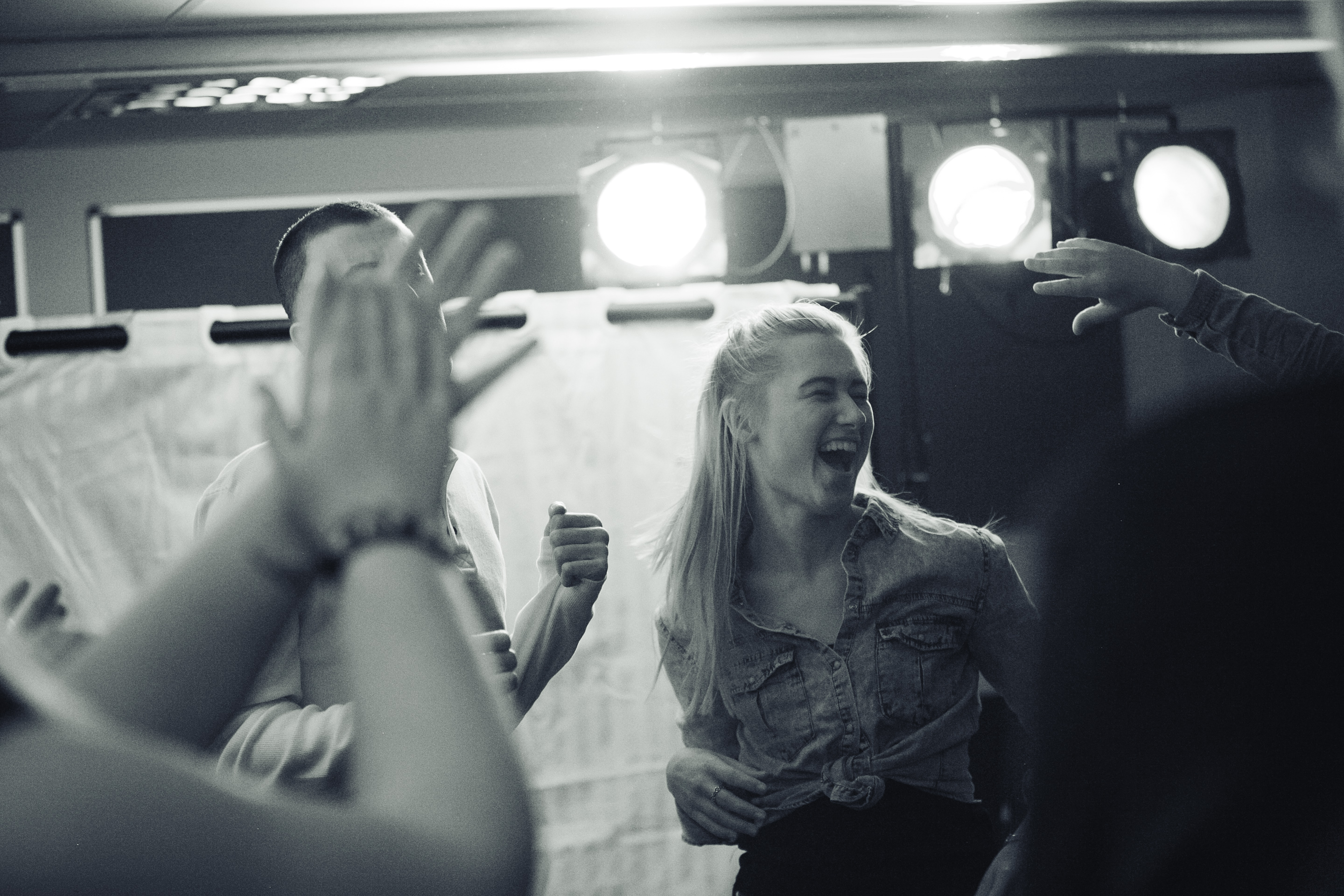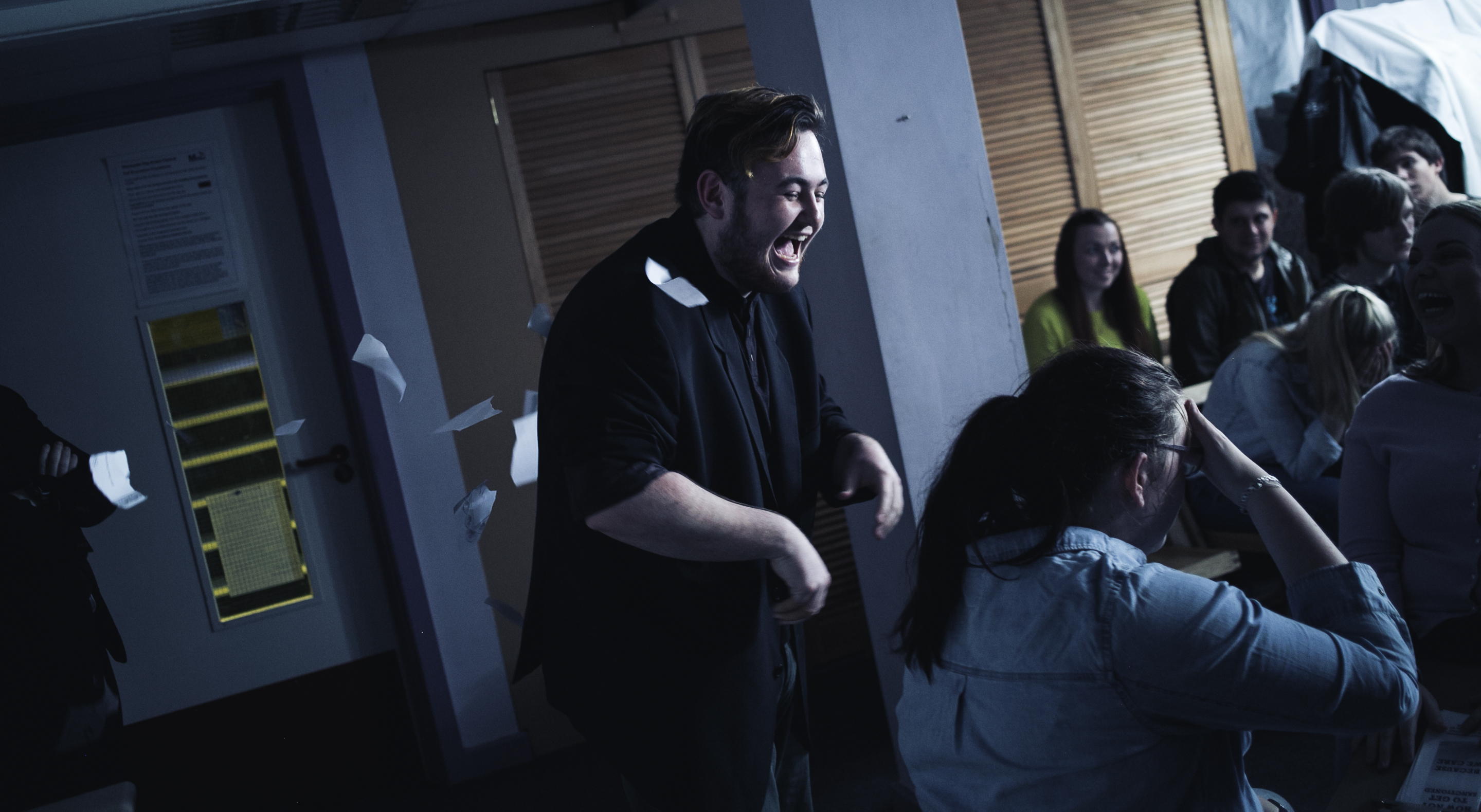Collective Encounters (Liverpool, UK) – practice and theory
We are delighted to publish a guest blog from Matthew Elliott, Youth Theatre Director at Collective Encounters. This blog post is a summary of Matthew’s presentation at the ‘Making Theatre in the Midst of Austerity‘ symposium at the University of Manchester on 4th November 2015. Listen to Matthew’s presentation, as well as other presentations at the symposium here
Prologue – Austerity as Ideology
Austerity is not born out of necessity but of one of the major ideological principles of neoliberalism – the reduction of the state (amongst other aspects such as private property rights, free market initiatives and global free trade). During the 2015 summer budget, Polly Toynbee (2015) highlighted this principle with the following statement; ‘The UK state will be smaller than the US as a proportion of GDP by 2019. Prior to the July budget, the IMF and OECD projected the UK state would fall to 36.6%, very close to the US at 35%. Germany is at 45.4%. The 2015 summer budget that included £12bn welfare reductions, reduces the UK state by a further 1.6%’.
Austerity measures perpetuate inequality; the continued reduction of public welfare services effects marginalised individuals and communities. Access to social provisions such as housing, healthcare and transport amongst others become restricted and only those who have accumulated (or inherited) enough economic, social or cultural capital have the ability to access other services. The UK is ‘wedded to the belief that the market should be the organising principle for all political, social and economic decisions’ (Giroux, 2004:xiii). Inequality is defined by those who can and cannot adhere to the principles of the market and austerity measures play a large role in this decision.
Theatre and Austerity – Collective Encounters
‘Collective Encounters’ work is framed within the umbrella of poverty and inequality. While the specific focus of each piece is different, depending on the interests of the groups, or on particularly timely topics, the work all stems from the deeprooted belief that we live in an inherently unequal and unjust society, and that theatre has a significant role to play as a tool for change: to explore problems and solutions, to empower citizens and communities’ (Collective Encounters Manifesto).
The company has three major strands – professional, participatory and research. The professional strand oversees professionally mounted productions. For example, Collective Encounters are currently under commission by the House of Memories project at National Museums Liverpool to deliver a participatory performance that explores person centred care for professional carers and family members supporting individuals living with dementia. The participatory strand encompasses the work within the community; this includes the youth programme, the transitions project, working with adults who are deemed to have complex issues and the third age theatre company.
The participatory strand predominantly works on a core – outreach model. Core groups enable continuity as outreach ensures the arts are accessible to marginalised communities; the ideal is for participants from outreach projects to join core groups. The research strand ensures that both participatory and professional strands are up to date with contemporary policy and research within the field of theatre for social change.
The work is predominantly based out of North Liverpool which is an area of extreme disadvantage and is ranked in the top 10 in England’s Indices of Multiple Deprivation. Collective Encounters’ practice has continued to work with communities in North Liverpool since its inception in 2005 whilst also working throughout Merseyside and the North West.
Collective Encounters decided that a change was needed in rediscovering the radical aspects of community theatre, as artistic director Sarah Thornton describes:
“Liberal artists work with communities to try to improve an individual’s own life chances and perhaps try to improve aspects of the system. The radical practitioner, on the other hand, understands the wider and deeper political context of the work and seeks ways of working with communities to challenge and change the systems that govern us.” (Thornton, 2012)
Collective Encounters’ work identifies and connects with wider movements such as the social justice movement as well as the leftists change framework. Collective Encounters are influenced by a range of thinkers and practitioners, including but not limited to the work of Hardt and Negri’s work on the multitudes of opposition, Freire’s process of conscientisation, Fraser’s theory of redistribution and recognition and Holloway’s ideas of ‘interstitial movements’. The list is ongoing, as there is a need for a pluralised approach to theory and practice that avoids ‘dogma’ as Sanjoy Ganguly (2010:134), the artistic director of Jana Sanskriti argues; the progression of thought in theatre practice is halted when it becomes limited by dogma.
The Centre – Collective Encounters Youth Theatre
A practical example of Collective Encounters practice is the 2015 Youth Theatre production – The Centre. The Centre was an immersive theatre performance that was instigated by the group’s response to local government cuts in Liverpool (58% cut in real terms funding since 2010/11). After a range of discussion based work, a participant asked ‘what will happen once all the money has gone?’ This led to a range of sketches that included wild, absurdist and extravagant ideas about how the future might be shaped if continuing austerity measures are introduced.
The performance was a product of ensemble devised performance and incorporated new approaches and styles including satire and absurdism as political comment. The Centre came to represent a dystopian future, a superficial alternative of hope and peace; but is controlled by the character of the ‘Manager’ with restricted freedoms and rights.
The show was the product of a year long process as a means to avoid notions of didacticism and enable a thorough understanding of the subject, in this case austerity. In order to do this, a range of stimulus was utilised from the Big Society to John Pilger’s War on Democracy.
The underlying aim as director of the piece was to establish a hybrid of high quality multi-disciplinary performance (physical theatre, song, satire, ensemble) with dialogical practice (debate, conscientisation and social change). The hybrid of ethical process and high quality product enabled the young people to explore and challenge the myths of the austerity discourse for themselves and their audience.
Ending note – Exposing Alternatives
The work of Collective Encounters is an ongoing process, as Holloway would argue it is about ‘creating the cracks in the austerity discourse’. Collective Encounters believe that there are alternative, self –determining communities and individuals. In these times of austerity, theatre needs an approach that not only addresses an issue but explores its contradictions –
“Rather than looking to the hero with true class consciousness, a concept of revolution must start from the confusions and contradictions that tear us all apart.” (Holloway, 2005:146)
Read Matthew’s report on his research trip to explore socially engaged arts practice in Latin America (funded by the Winston Churchill Fellowship (2014) – ‘Alternative Arts Engagement in Latin America’
Bibliography
Fraser, N. & Honneth, A. (2003) Redistribution or Recognition? A political-philosophical exchange. London, Verso
Ganguly, S. (2010) Jana Sanskriti – Forum Theatre and Democracy in India. London, Routledge.
Giroux, H. A. (2004) The Terror of Neoliberalism – Authoritarianism and the Eclipse of Democracy. London, Paradigm Publishers.
Hardt, M. & Negri, A. (2000) Empire. Harvard, Harvard University Press.
Holloway, J. (2010) Crack Capitalism. London, Pluto Press.
Thornton, S. (2012) The Personal to the Political: Theatre for Social Change in the 21st Century with particular reference to the work of Collective Encounters: a review of relevant literature, 2012. (Online) Available at: – http://collective-encounters.org.uk/wp-content/uploads/2014/02/What-is-Theatre-for-Social-Change1.pdf (Accessed 21st November 2015)
Toynbee, P. (2015) A return to public squalor and private excess. (Online) Available at: – http://www.theguardian.com/commentisfree/2015/jul/08/budget-2015-verdict-writers-george-osborne (Accessed 27th October 2015)



Comments are closed
Sorry, but you cannot leave a comment for this post.